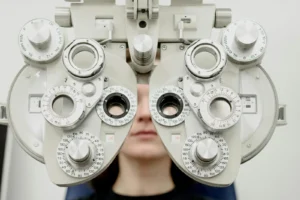There are many misconceptions about contact lenses that can prevent people from using them correctly or even trying them out in the first place. These myths can be based on outdated information or simply unfounded fears. Here are ten common myths about contact lenses, debunked:
I Can’t Wear Contact Lenses
Many individuals believe that they are unable to wear contact lenses due to unique eye conditions or specific prescriptions. However, with the remarkable technological advances in lens material and design, almost all prescriptions can now be corrected with contact lenses. Innovations in the field have made it possible to create contact lenses that cater to a wide variety of vision impairments. Whether you have astigmatism, presbyopia, or other conditions, there are lens options tailored for you. If you have been hesitant to try contact lenses, call us today for a FREE trial to see how they can transform your vision.
Contact Lenses Can Get Stuck Behind My Eye
One common and concerning myth is the fear that a contact lens could get stuck behind the eye. This is physically impossible due to the structure of your eye. The conjunctiva, a thin and transparent membrane, covers the white of your eye and is attached to the inside of your eyelids, creating a seal that keeps the contact lens securely in place. There’s no way for the lens to travel behind the eye thanks to this natural barrier. This understanding can help alleviate concerns and allow you to use contact lenses with more confidence.
Contact Lenses Are Uncomfortable
Prospective contact lens wearers often worry about discomfort. However, modern contact lenses are designed to be extremely comfortable. Advances in lens material means that many soft contact lenses can be described as feeling like a raindrop in your eye. They often contain moisture-rich wetting agents that keep them hydrated and soft, providing a refreshing sensation when worn. Additionally, advancements in lens technology have drastically reduced any initial discomfort, making the process of adapting to them easier than ever.
Contact Lenses Require Too Much Time and Effort
Another myth is that contact lenses require an overwhelming amount of time and effort to maintain. On the contrary, managing contact lenses can be incredibly simple. There are various options available, from daily disposable contact lenses that you can throw away after a single use, to monthly disposable lenses that only need a few minutes of cleaning each night. With these options, maintaining contact lenses can fit seamlessly into your daily routine, allowing for flexibility and ease of use without compromising eye health.
I’ll Never Get Them in My Eyes
The thought of inserting contact lenses can be intimidating for beginners. It might feel difficult initially, but with a bit of practice and guidance, it becomes second nature. Your optometrist and fully trained optical assistants will provide thorough instructions and support to ensure you are confident in both inserting and removing your contact lenses. Many people quickly adapt and find the process much easier than anticipated. Before long, inserting and removing contact lenses will become a quick and effortless part of your daily routine.
Contact Lenses Might Pop Out of My Eyes
There is a common misconception that contact lenses, especially during physical activity, might pop out of the eyes. However, new soft contact lenses are designed to stay securely in place even while on the move or playing sports. They adhere comfortably to the surface of your eye, minimising the chance of them becoming dislodged. This makes contact lenses a viable option for athletes and those with active lifestyles who require reliable and stable vision correction.
Contact Lenses Are Expensive
Many assume that contact lenses are a costly option compared to glasses. However, this is not necessarily the case. We offer a range of contact lenses to suit different lifestyles, as well as affordable schemes tailored to fit various budgets. With the variety of options available, from daily disposables to extended-wear lenses, contact lenses can be an economical and convenient choice for vision correction. There are often cost-effective solutions available that make contact lenses accessible to a wide range of people.
I’m Too Old to Wear Contact Lenses
Some believe that age is a barrier to wearing contact lenses. However, age is no longer a significant limitation. Contact lenses are now available as multifocal or bifocal options, designed for those who wish to wear them socially or for other activities. Additionally, for those who experience dry eyes as a natural part of ageing, there are contact lenses specifically engineered to alleviate dryness and enhance comfort. With the right type of lens, people of all ages can experience the benefits of contact lenses without discomfort.
I’m Too Young to Wear Contact Lenses
Conversely, others think that youth is a limiting factor. The decision to wear contact lenses is best made in consultation with your optometrist, who can assess if contact lenses would benefit you or your child. There is no fixed age at which one can start wearing contact lenses; it varies depending on individual needs and readiness. Often, children and teenagers adapt well to contact lenses, and they can be a great option for young athletes or those self-conscious about wearing glasses.
I Have Astigmatism Which Means I Can’t Wear Contact Lenses
Another prevalent myth is that contact lenses cannot correct astigmatism. Thanks to new technologically advanced lenses, this is no longer true. Toric contact lenses are specifically designed to correct a wide range of astigmatism and are available in daily, two-weekly, or monthly disposable forms. These lenses provide the same level of comfort and convenience as standard contact lenses, while correcting the specific visual distortions caused by astigmatism. With these options, even complex prescriptions can be effectively managed with contact lenses.
By debunking these common myths, we hope to encourage more people to explore the benefits of contact lenses. Whether you are new to contact lenses or have been hesitant due to misunderstandings, advancements in contact lens technology and design have made them a viable and comfortable option for nearly everyone. If you have any lingering concerns or questions, please reach out to us for more information or to schedule a consultation. Exploring contact lenses can open up new opportunities for vision correction that you may not have previously considered.



